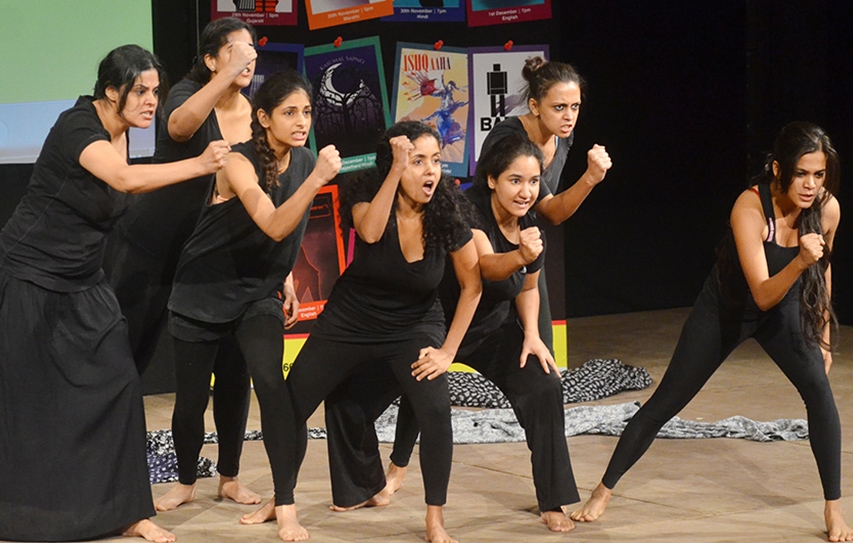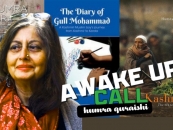
7/7/07: Heart Of Darkness
by Deepa Gahlot December 3 2015, 4:10 pm Estimated Reading Time: 4 mins, 32 secsReyhaneh Jabbari was just nineteen when she was arrested for the murder of a man who tried to rape her. After six years of torture and torment she was hanged in October 2014, despite worldwide protests and appeals for clemency.
This tragedy that took place in Iran, forms the base for Faezeh Jalali’s stunning new production,7/7/07 based on Reyhaneh’s writings and devised by ten actors—seven female, three male. Played out on a bare stage using light and shadows to great effect (lighting design Arghya Lahiri) the only props are the actors’ voices and bodies, as the story of Reyhaneh’s horror unfolds.
Reyhaneh is alternatively played by all the young women in the cast because she could be any teenager in any part of the world, and victim-shaming would probably be the same. Maybe in a more liberal country she would not be hanged, but the interrogation and humiliation in court would be the same.
According to how the world perceives sexual violence against women, Reyhaneh did many ‘wrong’ things. An enthusiastic design student, she gave her number to an older man, Dr Sarbandi who asked to design his clinic. She made the mistake of getting into a car alone with two strangers; the mistake of accompanying Dr Sarbandi to an apartment, fighting off his sexual assault by stabbing him, then running out of the place and calling an ambulance. She made the mistake of taking the knife with her and not telling her parents what happened. She was a young girl, she was confused and terrified, but the police twisted her innocence into something sordid and sinister. It was her misfortune that the dead man was a former intelligence official.
The investigators could not find the other man, who could have later stabbed Dr Sarbandi, because he was found dead with multiple stab wounds and Reyhaneh kept screaming that she had stabbed him once. To cover up for their own ineptitude, the cops and the prosecuting lawyer accused her of being a spy, of having an affair with Dr Sarbandi and premeditated murder. They made her confess to whatever they wanted by beating and torturing her and throwing her into solitary confinement for months on end. The rather strong defence was ignored by the judge who believed that a man from a religious family could not possibly have attempted to rape Reyhaneh.
Faezeh Jalali intersperses Reyhaneh’s trauma in prison, with her interactions with other women in prison, who try to help each other and survive the brutality as best as they can. There are moments of joy snatched from the unremitting bleakness. In post-Islamic Revolution Iran, women’s rights are tenuous at best, and for a young girl from an ordinary family, it is impossible to fight the full force of an unsympathetic system.
Islamic law allows the family of the victim to pardon the murderer. Reyhaneh is offered a pardon by Dr Sarbandi’s son, if she will withdraw the accusation of attempted rape against his father. She is offered a reprieve if she does not name him in court. She refuses to change her statement and accepts death with astonishing equanimity for one so young.
In her heart-rending last letter to her mother in which she expressed her dejection at the injustice she suffered, she also wrote, “Before my death I want something from you that you have to provide for me with all your might and in any way that you can. In fact this is the only thing I want from this world, this country and you. I know you need time for this. Therefore, I am telling you part of my will sooner. Please don’t cry and listen. I want you to go to the court and tell them my request. I cannot write such a letter from inside the prison that would be approved by the head of prison; so once again you have to suffer because of me. It is the only thing that if even you beg for it I would not become upset although I have told you many times not to beg to save me from being executed.
“My kind mother, dear Sholeh, the one more dear to me than my life, I don’t want to rot under the soil. I don’t want my eye or my young heart to turn into dust. Beg so that it is arranged that as soon as I am hanged my heart, kidney, eyes, bones and anything that can be transplanted be taken away from my body and given to someone who needs them as a gift. I don’t want the recipient know my name, buy me a bouquet, or even pray for me. I am telling you from the bottom of my heart that I don’t want to have a grave for you to come and mourn there and suffer. I don’t want you to wear black clothing for me. Do your best to forget my difficult days. Give me to the wind to take away.”
In her death she inspired women and continues to do so—Faezeh Jalali’s play reduces to tears people in Mumbai, far removed from Reyhaneh’s story, audiences that shy away from dark and depressing plays. Nobody can remain unmoved by this play.




-173X130.jpg)
-173X130.jpg)

-173X130.jpg)
-173X130.jpg)


